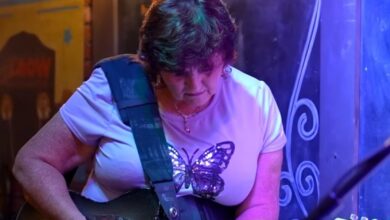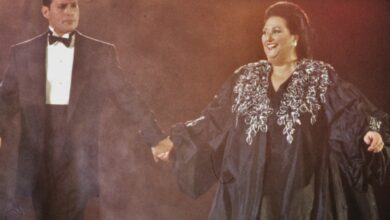Jack Black and James Hetfield Deliver a Stunning Chris Cornell Tribute at The Forum
The Forum in Los Angeles turned into a gathering place of powerful emotions during “I Am the Highway: A Tribute to Chris Cornell,” a night that brought together icons from across rock history. What made the atmosphere so compelling was the balance between reflection and celebration, a shared understanding that Cornell’s influence deserved more than a somber memorial. The audience, nearly twenty thousand strong, arrived not only to grieve but to honor the fearless creativity and voice that shaped a generation. From the first lights to the final encore, the venue vibrated with respect, admiration, and anticipation for each unexpected turn the event promised. No one could fully predict what would unfold, and that mystery kept everyone locked into every second.
That sense of unpredictability crystalized when Jack Black walked onto the stage to introduce Metallica. Known for comedic chaos, he didn’t simply announce the next act. He spoke directly to Cornell’s legacy, praising his unmatched vocal range with humorous exaggeration that still carried heartfelt truth. The crowd laughed, but behind the laughter was recognition of Cornell’s ability to push boundaries far beyond what most singers dare attempt. Black’s timing was sharp, and with each line his admiration shone through, setting the tone for a tribute fueled not by sorrow but by electrifying gratitude.
What happened next wasn’t rehearsed, wasn’t scripted, and quickly became one of the night’s signature moments. Without warning, Black launched into a booming a cappella blast of “Spoonman,” surprising everyone in the arena. His energy shot upward instantly, flipping the emotional switch from solemn respect to roaring celebration. The humor melted into pure rock spirit, and the audience erupted. It was the kind of spontaneous shift that marks a concert as historic, a sudden reminder that grief and joy often walk hand in hand when music is the anchor.
Then James Hetfield entered the spotlight, guitar in hand, and the entire building surged to its feet. Black and Hetfield traded a quick sonic spark, a brief connective roar that hinted at Metallica’s “One” before the comedian stepped away with a grin. It was not a duet built for perfection but a moment built for humanity. Two performers from different worlds collided simply to honor a friend whose voice had given power to countless fans, musicians, and dreamers. That handoff created a heartbeat-stopping emotional shift that perfectly introduced what came next.
Metallica did not treat the tribute like a tour stop or a routine slot. Their setlist dug deep, pulling early Soundgarden tracks such as “All Your Lies” and “Head Injury” into the spotlight. It was a salute to Cornell’s beginnings, the formative years that defined the edge and grit of Seattle’s heavy sound. Hetfield’s vocals carried raw authenticity, while the band’s precise aggression conveyed respect rather than imitation. They made it clear: this wasn’t about recreating Soundgarden, but about honoring the roots of what Chris built from the ground up.
Fans near the stage spoke later about how the transition from Jack Black’s raucous burst to Metallica’s fierce execution captured the full emotional arc of the night. The joy of memory crashed into the power of legacy, and the audience met both feelings with open hearts. The lights cut sharp across the stage, illuminating the focus in the band’s faces. Every chord and every strike on the snare felt like a message of gratitude aimed directly at Cornell and the community he fostered. It was a reminder that the night was built on shared love for a voice that once shook the world.
As the show continued, other artists stepped into the light, creating a patchwork of tributes that reflected the many different sides of Cornell’s music. Foo Fighters delivered raw emotion, while Brandi Carlile brought a folk-tinged tenderness that highlighted the versatility of his songwriting. Miley Cyrus stunned with passionate intensity, proving that Cornell’s music spans generations without losing force. Each act offered a unique tribute, yet all shared the same reverence for a voice that carried resilience, darkness, and beauty in every syllable.
Behind every performance was a deeper narrative about the impact one artist can have across genres and decades. Cornell’s influence extended far beyond the boundaries of grunge, and this event made that truth impossible to ignore. Pop voices, metal titans, and alternative legends moved through his discography with equal conviction. The versatility on display emphasized how Cornell’s work acted as a bridge—connecting musicians who may never otherwise share a stage. It was a reminder that great art refuses limitation, and his songs continue to evolve long after his final bow.
The visuals supported the emotional spectrum as well. The Forum’s production shifted seamlessly between intimate spotlights and explosive full-stage assaults. Video screens highlighted smiling memories, magical collaborations, and moments of Cornell fully lost in his art. The photographs and camera cuts never overshadowed the music; they enhanced it. They reminded every soul in attendance that they weren’t just mourning a singer. They were honoring a creator whose voice continues to inspire rebellion, healing, and discovery in equal measure.
The closing sentiment that anchored the night was crystal clear: community is what keeps legacy alive. A comedian shouting “Spoonman,” a thrash legend answering with a guitar, and an arena responding with deafening gratitude—these are the memories that turn tribute into immortality. By the show’s end, fans left with a renewed understanding of what Chris Cornell gave to the world: a sound that demanded honesty, a spirit that encouraged courage, and songs that will continue to echo long after the last spotlight fades.





